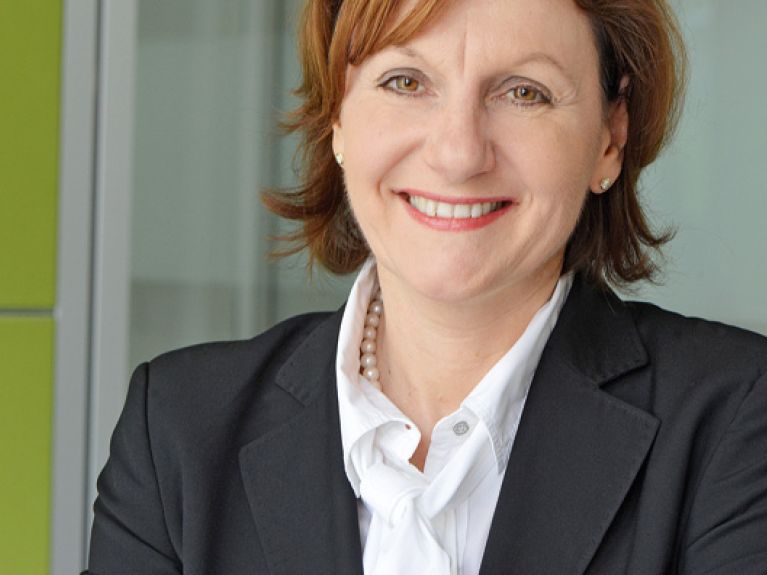“As liberal as possible”
Germany has opened its doors to qualified immigrants, says Christine Langenfeld of the Expert Council of German Foundations for Integration and Migration

The latest report of the Expert Council of German Foundations for Integration and Migration (SVR) acknowledges Germany’s successful transformation into a liberal immigration country. The council sees successful development especially in the area of economic migration. Is Germany now well placed to overcome the shortage of skilled professionals?
In 2012 and 2013, Germany completed a remarkable paradigm shift and opened its labour market up to qualified migrants from third countries. Anyone can come who has a recognised training or higher education qualification and the prospect of a job in which he or she will earn 47,600 euros a year – or 37,200 euros in the case of so-called shortage occupations, for example, in the fields of IT or medicine. This applies to non-graduates if their skills are in a field in which Germany has especially great demand. In addition, people from third countries with a university degree can now live in Germany for six months and look for a job.
How does Germany immigration policy compare with that of other countries?
According to a new OECD study, the German regulations are among the most liberal in the world. Although Germany has opted for an immigration strategy that requires a contract of employment, otherwise the arrangements are extremely simple. Skills plus job offer – that’s all you need. If you take a look at so-called traditional immigration countries like Canada and the United States, you find far more selective rules with a high level of intransparency.
Did the labour market situation trigger this paradigm shift?
It was certainly a decisive factor. The shortage of skilled specialists is very evident in certain occupations and regions. That’s why when Germany introduced the Blue Card required by the European Union it made the rules as liberal as possible. It would have been possible to apply quotas and restrictions, but this was consciously eschewed – as a result of the political realisation that Germany needs immigration. However, the take up of these new statutory opportunities is still far below our long-term requirement. In the last two years we have issued roughly 14,000 Blue Cards – a majority of them to people who were already in Germany and only changed their status. Far too few people make use of the option to come to Germany and look for a job. A lot of catching up still needs to be done. Above all, however, Germany’s new self-image has to be communicated abroad and filled with life at home.
In this context, how important is the frequently cited “culture of welcome”?
Very important. It is difficult to become established in a new country. You meet unfamiliar people in unaccustomed situations with a new daily routine – you need networks. Above all, the municipalities need to act here. They should welcome the families and help parents to send their children to the right schools and receive good healthcare. Naturally, the development of such a culture of welcome takes time. For a long time, Germany emphasised that it was not an immigration country, although in effect it was. Many actors are now responsible for shaping this transformation: politics, industry and higher education.
German higher education institutions are attracting more and more international students. What role do they play on the labour market?
International students are ideal immigrants. They know Germany, know the language and are familiar with the social circumstances. They already became integrated during their studies. To that extent, it has to be in Germany’s interest to persuade at least a proportion of these students to remain in the country after graduation.
Earlier studies by the Expert Council of German Foundations for Integration and Migration have shown that although many international students would like to stay, only a few actually do. What has changed since the experts pointed out this discrepancy?
In 2012, a number of regulations came into force that have made the transition from studying to working much easier for university graduates from non-EU countries. International students now have 18 rather than just 12 months to find a job that matches their qualifications. During this one-and-a-half years they can work full-time to finance their stay. That is a considerable improvement, which has catapulted Germany into one of the top places in the European ranking. However, there continues to be a gap between the wish to remain and its realisation. Unfortunately, many people do not know about the new regulations. Here, too, there is more work to be done.
How closely do politics and research work together in developing new strategies?
Research is in a position to draft well-grounded and independent proposals and to create trust as a result of the incorruptibility of its analysis. If it succeeds in communicating its findings in an understandable way, it can influence the public and the policymakers. That is what happened with regard to the labour market. As a panel of experts, we consider it our responsibility to support policymakers in a constructive way. We formulate criticism where it is necessary and emphasise positive developments so that they can be continued.
What do you believe the future approach should be?
From the perspective of the SVR, it is time to set up a National Action Plan for Migration. Initially, that should be a communication platform that enables all actors in the fields of migration and integration to come together and all immigration paths – from economic migration to student and family migration to refugee migration – to be discussed. Working on the basis of solid empirical findings, we want to ascertain together how much immigration can be expected in the near future and what Germany’s needs are. We hope this will lead to the development of a kind of “immigration policy visiting card” that positions Germany visibly as an immigration country. ▪
Interview: Helen Sibum

